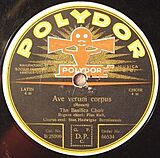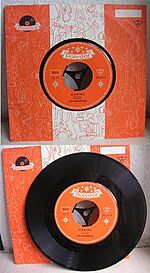Polydor Records facts for kids
Quick facts for kids Polydor Limited |
|
|---|---|
 |
|
| Parent company | Universal Music Group (UMG) |
| Founded | 2 April 1913 |
| Distributor(s) |
|
| Genre | Various |
| Country of origin | Germany United Kingdom |
| Location | London, England |
Polydor, also known as Polydor Records, is a famous British record label. It is part of the Universal Music Group, which is one of the biggest music companies in the world. Polydor works closely with other labels like Interscope Geffen A&M Records.
Polydor helps distribute music for artists in different countries. For example, Polydor releases music from Interscope artists in the UK. In return, Interscope helps distribute Polydor's music in the United States.
Many well-known artists have released music with Polydor. Some of these include The Who, Jimi Hendrix, Bee Gees, Lana Del Rey, Ellie Goulding, and Sam Fender.
Contents
The Story of Polydor Records
How Polydor Started
Polydor Records began a long time ago, on April 2, 1913, in Germany. It was founded by a company called Polyphon-Musikwerke AG. This company originally made mechanical music boxes.
During World War I, the German government took over a British-owned record company called Deutsche Grammophon. Polyphon-Musikwerke AG then bought this company. Polydor became a special label used for exporting music from Germany to other countries starting in 1924.
In 1941, a big company called Siemens & Halske bought Deutsche Grammophon, which included Polydor. After World War II, Polydor became known for popular music. Deutsche Grammophon, on the other hand, focused on European classical music.
Growing with Famous Artists
In the early 1960s, Polydor signed some very important artists. One famous orchestra leader, Bert Kaempfert, signed a young band called The Beatles. They were known as The Beat Brothers back then.
Many other popular international artists also joined Polydor. These included James Last and Bert Kaempfert himself. In 1962, Siemens teamed up with Philips to create the Grammophon-Philips Group. Polydor became a part of this larger music group.
Throughout the late 1960s, Polydor released albums from major rock bands. These included Cream, The Who, Jimi Hendrix, Bee Gees, and Eric Clapton.
Polydor opened its own office in the United States in 1969. It became even more important in the US music scene in 1971. This happened when Polydor bought the recording contract of the famous R&B singer James Brown.
Becoming PolyGram
In 1972, the Grammophon-Philips Group changed its name to PolyGram. This new name came from combining "Polydor" and "PhonoGram." Polydor continued to be a major label under PolyGram.
During the 1970s, Polydor became a very successful rock label. It also released hit songs from artists like the Bee Gees and Gloria Gaynor.
In the 1980s, Polydor continued to do well. It even took over managing the pop music collection of British Decca Records. However, another PolyGram label, Mercury Records, started to become more famous.
By the early 1990s, Polydor was not doing as well. PolyGram decided to make some changes. Polydor became part of a new group called the PolyGram Label Group (PLG). This group was created to help manage labels that were not performing as strongly.
Later, in 1994, Polydor Records merged with Atlas Records. For a short time, they were called "Polydor/Atlas." They then started working through A&M Records, another PolyGram company. By 1995, they were simply Polydor Records again.
Polydor in North America
For a few years, Polydor tried to keep going by signing new artists and re-releasing old music. However, it became less active in the United States. In 1998, a company called Seagram bought PolyGram. Seagram then combined PolyGram with its own Universal Music Group.
During this big merger, Polydor's operations in the United States joined the Interscope-Geffen-A&M label group. But Polydor's international offices continued to operate. Its music was still distributed in the US by Interscope and A&M.
Today, in North America, the Polydor Records name is mostly used for re-releasing older music. This includes hits from the 1960s and 1970s. Island Records handles most of the older Polydor releases in the US. Republic Records handles reissues from James Brown and other pop catalogs.
However, in the 2010s, Interscope Records did occasionally release new music under the Polydor name. Artists like Lana Del Rey released music with Polydor branding. In 2024, Polydor joined Universal Music Group's Interscope Capitol Labels Group.
Polydor Nashville
In 1994, a record producer named Harold Shedd started Polydor's Nashville division. This part of the company focused on country music. Some of the artists who signed with Polydor Nashville included Toby Keith and Chely Wright.
In 1996, the Nashville division changed its name to A&M Nashville. It closed later that year. Today, Polydor helps distribute albums from Lost Highway Records in some countries.
Polydor UK
In 1972, the British Polydor Records Ltd. changed its name to Polydor Ltd. In the early 1970s, a very successful UK band called Slade brought in a lot of money for the label. Other popular acts included the New Seekers and The Who.
Jerry Jaffe was a Senior VP at Polydor/PolyGram during the 1970s and 1980s. He signed important bands like Motörhead, Dexys Midnight Runners, and the Jam. He also worked with famous artists like John Lennon.
Even though Polydor's American branch is not very active, Polydor in the United Kingdom is still one of the most important labels. It has many popular artists like Take That, Cheryl, Ellie Goulding, and Mabel.
Polydor also has a strong group of independent artists through its Fiction Records label. These include bands like Elbow and Snow Patrol. Polydor also helps distribute music for American artists like Eminem, Billie Eilish, and Lady Gaga in the UK.
In 2006, Polydor started a new music label called Fascination Records. This label focuses on pop music. Groups like Girls Aloud and the Saturdays moved to this new label. Fascination also signed pop artists from the US, such as Demi Lovato and Jonas Brothers.
In 2008, A&M Records UK was created as part of Polydor UK. That same year, Polydor also started distributing music for the Rolling Stones. This included their older songs and any new releases.
In 2024, British singer-songwriter Raye won many awards for her music. Her album My 21st Century Blues and hit song "Escapism" were released independently after Polydor UK decided not to release them. Raye broke the record for the most nominations received by a single artist in a year at the 2024 Brit Awards.
Polydor Japan
Polydor Records first started in Japan in 1926 as Nippon Polydor. Over the years, the company's name changed a few times. In 1972, it became a part of PolyGram as Poloydor K.K.
In 1990, PolyGram Co., Ltd. was founded to oversee the PolyGram group in Japan. Polydor K.K. continued to produce music. In 1999, its parent company became Universal Music Japan. Polydor K.K. then merged with another company in 2001 and became Universal Polydor. In 2002, Universal Polydor changed its name to Universal J.
In December 2022, Universal Japan reorganized Universal J. The label was split into two parts: UJ and Polydor Records. Polydor Records officially started operating as a division of Universal Japan on January 1, 2023.
Polydor's Japanese division currently has three smaller labels. These are Perfume Records, Asse!! Records, and Utahime Records. It also helps distribute music for NHK Records.
See also
 In Spanish: Polydor Records para niños
In Spanish: Polydor Records para niños
- Artists who have recorded with Polydor Records
 | Jessica Watkins |
 | Robert Henry Lawrence Jr. |
 | Mae Jemison |
 | Sian Proctor |
 | Guion Bluford |



